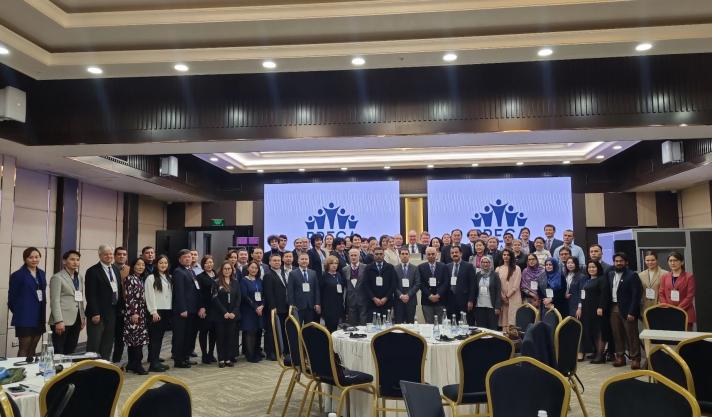
Different forms of mass gatherings, whether they involve sport events, concerts, religious gatherings, or political rallies are an inherent part of many communities in Central Asia. Organizing such events pose unique challenges to emergency services due to the concentration of large numbers of people in confined spaces. Effective public communication on safety and security measures could prevent incidents such as food poisoning or explosions, or their escalation.
Tackling misinformation and disinformation in crisis situations that may occur during mass gathering events is paramount for ensuring public safety and maintaining trust in institutions. In such high-pressure scenarios, the spread of false information can exacerbate panic, hinder effective response efforts, and jeopardize public health.
By addressing misinformation and disinformation promptly and effectively, authorities can mitigate the potential impact on public perception and ensure accurate information reaches those in need.
60 public communication experts from 6 partner countries
As part of its mission to advance CBRN risk mitigation and strengthen security and safety worldwide, the European Union has supported in Central Asia a comprehensive training on risk communication and media engagement in crisis situations that may evolve during mass gatherings.
Organized in Tashkent, Uzbekistan, in the context of the EU CBRN CoE Initiative, the three-day training (4–6 March 2024) aimed to equip participants with essential skills in risk communication, addressing disinformation and engaging with the media during mass gatherings.
The training reached over 60 strategic communication officers and technical experts from relevant national agencies of six partner countries, namely: Kazakhstan, Kyrgyz Republic, Mongolia, Pakistan, Tajikistan, and Uzbekistan. All participating countries are members of the EU CBRN CoE Regional Secretariat for Central Asia.
“As observed during the COVID-19 pandemic, effective communication is paramount in times of public health crises. It serves as the cornerstone of our collective efforts to ensure the safety and well-being of our communities.”
Mr Bakhtiyor Gulyamov, Head of the EU CBRN CoE Regional Secretariat for Central Asia, during the high-level plenary opening session on 5th March
Collaboration, planning and continuous capacity-building
Delivered jointly by European Commission’s Joint Research Centre, UNICRI and a team of international experts supporting the EU CBRN CoE’s PRECA Project, the training underscored the importance of advance risk assessments, timely risk communication, effective media engagement and proactive measures in countering disinformation. It emphasized the need for collaborative efforts, strategic planning and continuous capacity building to effectively address the evolving challenges posed by disinformation.
The training featured an interactive tabletop exercise with a focus on effectively working with the media and responding to disinformation in crisis situations during mass gatherings. Through group exercises and simulated scenarios, participants enhanced their skills and knowledge in debunking disinformation tactics through training on new techniques and strategies, including response planning, information verification, public awareness campaigns, and collaboration with stakeholders.
Some key takeaways:
- Assessing risks involves not only identifying potential health hazards but also understanding the dynamics of the gathering itself, infrastructure limitations, and emergency response capabilities
- Communicating risks effectively in such situations requires a nuanced understanding of the diverse audiences involved, ranging from event attendees and local residents to emergency responders and public health officials
- The fast-paced and dynamic nature of a crisis during mass gatherings necessitates rapid dissemination of information through all platforms, and real-time adjustments to communication plans as situations evolve
- Fostering transparency, trust, and collaboration among all stakeholders can empower individuals to make informed decisions, promote compliance with public health measures, and enhance overall safety and resilience during mass gatherings
Strengthening preparedness and response for mass gatherings and health threats in Central Asia
The European Union supported the training on risk communication, media engagement and tackling disinformation during mass gatherings, as part of the EU CBRN CoE Project 87 “Preparedness and Response for Mass Gatherings and Other Health Threats in Central Asia (PRECA)”.
Implemented within the framework of the EU CBRN Centres of Excellence Initiative, PRECA is a regional initiative aimed at strengthening response and preparedness for potential health threats stemming from mass gatherings in partner countries in Central Asia. The participating countries include Kazakhstan, Kyrgyz Republic, Mongolia, Pakistan, Tajikistan and Uzbekistan.
Funded by the European Union, the project is implemented by the International Science and Technology Center (ISTC) in close cooperation with national experts from Partner Countries, CoE National Focal Points in Central Asia, UNICRI, the CoE Regional Secretariat and the EU Delegations in the participating countries.
Read PRECA factsheet to learn more about the activities implemented and the main achievements.
Details
- Publication date
- 28 March 2024
- Authors
- Service for Foreign Policy Instruments | Joint Research Centre
- CBRN areas
- Bio-safety/bio-security
- Crisis management
- First response
- Public and infrastructure protection
- Public health impact mitigation
- Safety and security
- CBRN categories
- Chemical
- Biological
- Radiological
- CoE Region
- CA - Central Asia

